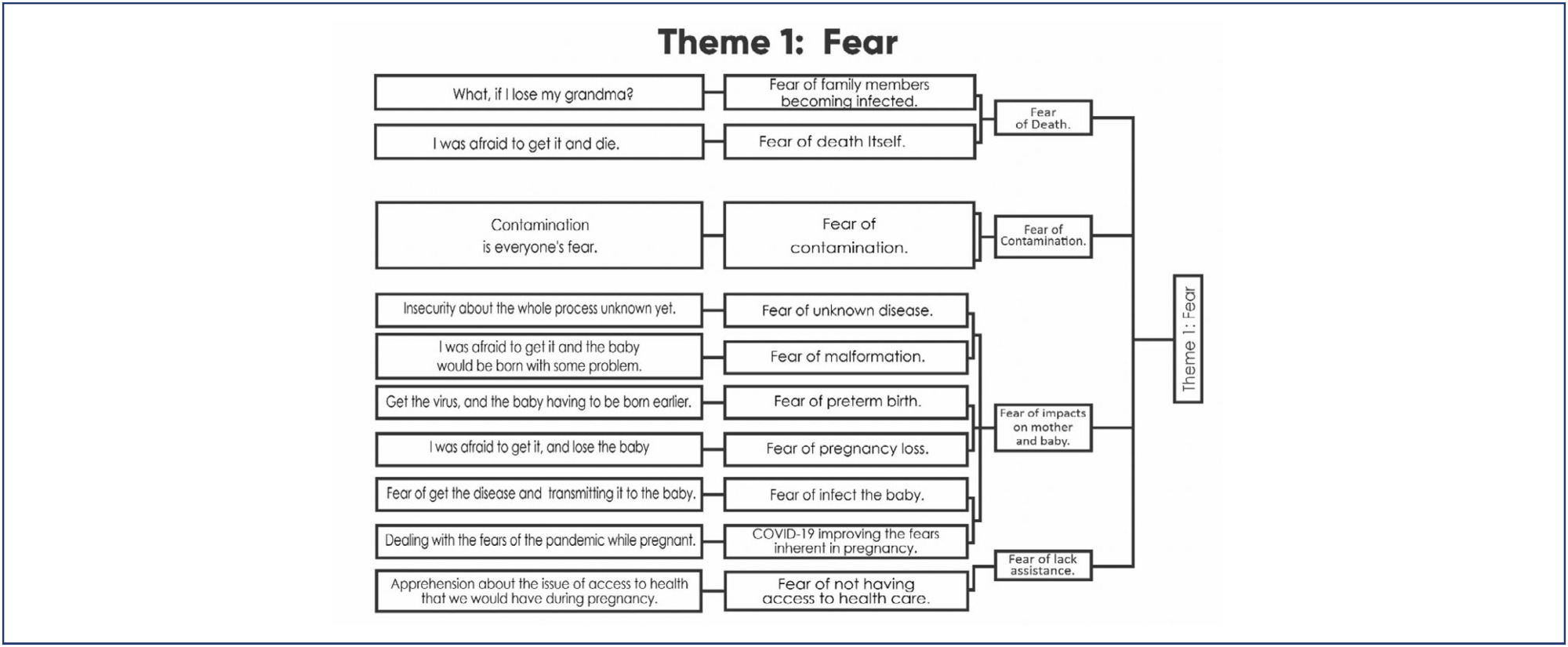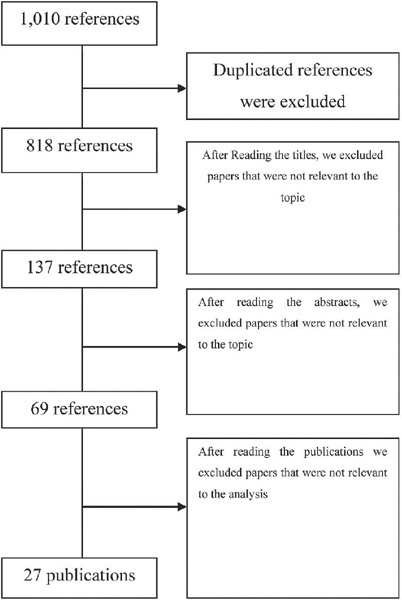-
Original Article03-18-2025
The experience of pregnancy in the COVID-19 pandemic
Revista Brasileira de Ginecologia e Obstetrícia. 2025;47:e-rbgo8
Abstract
Original ArticleThe experience of pregnancy in the COVID-19 pandemic
Revista Brasileira de Ginecologia e Obstetrícia. 2025;47:e-rbgo8
Views326See moreAbstract
Objective:
To describe women's experience of pregnancy during the COVID-19 pandemic.
Methods:
A qualitative study conducted in a private maternity hospital, from May, 2020 to November, 2021, with women aged ≥ 18 years, gestational age ≥ 36 weeks at birth and ≥ 24 hours post-partum. Data collected through semi-structured interviews, recorded, transcribed, and analyzed adopting Krippendorff's Content Analysis as theoretical-methodological framework.
Results:
Four main themes emerged: Fear, Taking care and celebrating pregnancy: adjusting to the new reality, Harms of Isolation, and Benefits of Isolation. The fear of contamination and its impact on the health of mother and child resulted in the adoption of severe social isolation, including from those considered sources of support by the expecting mother. Overwhelmed, some of the participants reported loneliness and psychic suffering. The opportunity to focus on the pregnancy, the preparations for the arrival of the child, and the family made isolation a beneficial and positive period for other women.
Conclusion:
The experience of pregnancy in the Pandemic was an event outside of the ordinary and common. The expecting mother faced her worst fears on a daily basis and attended prenatal care, in order to ensure her child would be born healthy. The celebration of the baby's life, amid so many deaths, had to be adjusted to the virtual environment. It was a tense, solitary, and ambiguous period, which demanded a lot from the mental health of some participants, but to others, brought advantages that would not have been possible in different times.

-
Original Article06-27-2024
The impact of surgical treatment for deep endometriosis: metabolic profile, quality of life and psychological aspects
Revista Brasileira de Ginecologia e Obstetrícia. 2024;46:e-rbgo42
Abstract
Original ArticleThe impact of surgical treatment for deep endometriosis: metabolic profile, quality of life and psychological aspects
Revista Brasileira de Ginecologia e Obstetrícia. 2024;46:e-rbgo42
Views324Abstract
Objective
To evaluate the effects of surgical treatment of deep endometriosis on the metabolic profile, quality of life and psychological aspects.
Methods
Prospective observational study, carried out with women of reproductive age diagnosed with deep endometriosis, treated in a specialized outpatient clinic, from October/2020 to September/2022, at a University Hospital in Fortaleza - Brazil. Standardized questionnaires were applied to collect data on quality of life and mental health, in addition to laboratory tests to evaluate dyslipidemia and dysglycemia, at two moments, preoperatively and six months after surgery. The results were presented using tables, averages and percentages.
Results
Thirty women with an average age of 38.5 years were evaluated. Seven quality of life domains showed improved scores: pain, control and impotence, well-being, social support, self-image, work life and sexual relations after surgery (ES ≥ 0.80). There was an improvement in mental health status with a significant reduction in anxiety and depression postoperatively. With the metabolic profile, all average levels were lower after surgery: total cholesterol 8.2% lower, LDL 12.8% lower, triglycerides 10.9% lower, and fasting blood glucose 7.3% lower (p < 0.001).
Conclusion
Surgical treatment of deep endometriosis improved the quality of life and psychological aspects of patients. The lipid profile of patients after laparoscopy was favorable when compared to the preoperative lipid profile.
Key-words AnxietyDepressionEndometriosisInflammationLaparoscopyLipidsMental healthPelvic painQuality of lifesurveys and questionnairesSee more -
Original Article00-00-2024
Prevalence and factors associated with anxiety, depression and burnout in gynecology and obstetrics residents during the COVID-19 pandemic
Revista Brasileira de Ginecologia e Obstetrícia. 2024;46:e-rbgo17
Abstract
Original ArticlePrevalence and factors associated with anxiety, depression and burnout in gynecology and obstetrics residents during the COVID-19 pandemic
Revista Brasileira de Ginecologia e Obstetrícia. 2024;46:e-rbgo17
Views531Abstract
Objective:
To determine the prevalence of anxiety, depression and burnout in residents of Gynecology and Obstetrics during COVID-19 pandemic in Brazil and its associated factors.
Methods:
Cross-sectional study involving all regions of Brazil, through the application of a sociodemographic questionnaire, the Hospital Anxiety and Depression Scale (HAD) and the Maslach Burnout Inventory (MBI-HSS) instrument. Multivariate analysis was performed after adjusting the Poisson model.
Results:
Among the 719 participating medical residents, screening was positive for anxiety in 75.7% and for depression in 49.8% of cases. Burnout syndrome was evidenced in 41.3% of the physicians studied. Those with depression are more likely to have anxiety (OR 0.797; 95%CI 0.687 - 0.925) and burnout syndrome (OR 0.847 95%CI 0.74 - 0.97). Residents with anxiety (OR 0.805; 95%CI 0.699 - 0.928) and burnout (OR 0.841; 95%CI 0.734 - 0.963) are more likely to have depression.
Conclusion:
High prevalence of anxiety, depression and burnout were found in residents of Gynecology and Obstetrics in Brazil, in addition to important correlations between anxiety-depression and depression-burnout.
Key-words AnxietyBrazilBurnout, psychologicalCOVID-19DepressionGynecologyinternship and residencymedical residencyMental healthObstetricspandemicsSee more -
Review Article08-07-2023
Mental Health Disorders in Circumcised Reproductive-age Women, Legal Dimensions and Prevention Strategies: A Narrative Review
Revista Brasileira de Ginecologia e Obstetrícia. 2023;45(5):281-288
Abstract
Review ArticleMental Health Disorders in Circumcised Reproductive-age Women, Legal Dimensions and Prevention Strategies: A Narrative Review
Revista Brasileira de Ginecologia e Obstetrícia. 2023;45(5):281-288
Views246See moreAbstract
Objective:
Female genital mutilation/cutting (FGM/C) can affect women’s lives through various physical, psychological, social and even sexual mechanisms. According to the World Health Organization guidelines for managing the health effects of FGM/C, further research into its psychological effects and preventative measures is required. In this study, a comprehensive review of the mental health consequences of circumcised women of reproductive age has been conducted with a special focus on providing preventive solutions.
Methods:
A comprehensive search of the Web of Science, PubMed(MEDLINE), Proquest ,Scopus and Google scholar was carried outfrom 2000 to 2022. The second stage of search was conducted in grey literature. To facilitate a systematic approach to search the literature, the PECO framework, was adopted.
Results:
The result of this narrative review study showed that, the most common mental health disorder in reproductive age circumcised women were depression, anxiety and post-traumatic stress disorder. Some studies found a significant relationship between parents’ education level and circumcised girls, so that parents of the circumcised women had a low level of education. Two studies considered religious beliefs, tradition, cleanness, sexual desire control and virginity as the reasons for FGM/C.
Conclusion:
All forms of FGM/C may be harmful to one’s health. Women, who have undergone widespread forms of circumcision, are more likely to develop mental disorders. As the psychosocial effects of circumcision can affect the sexual experience of circumcised women, addressing this issue, emphasizing its legal aspects, and providing preventative solutions can improve physical, mental, social, and even sexual health in circumcised women.
-
Review Article07-10-2023
Technologies Applied to the Mental Health Care of Pregnant Women: A Systematic Literature Review
Revista Brasileira de Ginecologia e Obstetrícia. 2023;45(3):149-159
Abstract
Review ArticleTechnologies Applied to the Mental Health Care of Pregnant Women: A Systematic Literature Review
Revista Brasileira de Ginecologia e Obstetrícia. 2023;45(3):149-159
Views318See moreAbstract
Objective:
This article aims to review the literature regarding the use of technologies to promote mental health for pregnant women. We seek to: understand the strategies that pregnant women use for mental health care. Also, we investigate the existence of scientific evidence that validates such practices.
Methods:
This study follows the PRISMA guidelines for systematic reviews. We analyze 27 studies published between 2012 and 2019. We include publications in Portuguese, English, and Spanish.
Results:
The results revealed several different possibilities to use technology, including the use of text messages and mobile applications on smartphones. Mobile applications are the most commonly used approaches (22.5%). Regarding the strategies used, cognitive-behavioral approaches, including mood checks, relaxation exercises, and psychoeducation comprised 44.12% of the content.
Conclusion:
There is a need for further investigation and research and development efforts in this field to better understand the possibilities of intervention in mental health in the digital age.

-
Original Article08-29-2022
Sexual Violence Suffered by Women in Early and Late Adolescence: Care Provided and Follow-Up
Revista Brasileira de Ginecologia e Obstetrícia. 2022;44(7):667-677
Abstract
Original ArticleSexual Violence Suffered by Women in Early and Late Adolescence: Care Provided and Follow-Up
Revista Brasileira de Ginecologia e Obstetrícia. 2022;44(7):667-677
Views242Abstract
Objective
To compare the sexual violence suffered by women in early and late adolescence, the reactions triggered after the aggression, and the care provided.
Methods
A retrospective study in which we reviewed the medical records of 521 female adolescents treated by a multidisciplinary team at a reference hospital in the city of Campinas, state of São Paulo, Brazil. We analyzed sociodemographic variables, and those pertainin to the characteristics of the episodes of violence, the emergency care, and the physical and psychological reactions observed during the follow-up. For the analysis, the sample was divided into groups of early (10 to 14 years) and late (15 to 18 years) adolescence. We used the Chi-squared/Fisher Exact, Mann-Whitney, and Kruskal-Wallis tests to compare the groups; the level of significance adopted was 5%.
Results
The early group (n= 242) contained more adolescents who were enrolled in school (p< 0.001), suffered more daytime aggressions (p= 0.031), in their residences (p< 0.001), by an aggressor with whom they were acquainted (p< 0.001), had greater need of legal protection (p= 0.001), and took longer to seek care (p= 0.048). Feelings of guilt, shame, and the perception of violence were similar between the groups. In the late group (n= 279), there was greater consumption of alcohol during the aggression (p= 0,005); they received significantly more prophylaxis treatments; reported more physical symptoms (p= 0.033), sleep disorders (p= 0.003), symptoms of anxiety (p= 0.045), and feelings of anguish (p= 0.011); and had more prescriptions of psychotropics (p= 0.005). Only 52% completed the 6-month follow-up, with no differences between the groups.
Conclusion
The age groups showed differences in the characteristics of the episodes of violence; early adolescents took longer to seek help, and the late group presented more intense symptoms and psychological worsening during the follow-up. Measures of prevention and specific care aimed at this population are needed.
Key-words Adolescenceemergency careMental healthretrospective studysexual assaultSexual violenceWomenSee more -
Original Article02-09-2022
Emotional and Clinical Aspects Observed in Women with Gestational Trophoblastic Disease: A Multidisciplinary Action
Revista Brasileira de Ginecologia e Obstetrícia. 2022;44(4):343-351
Abstract
Original ArticleEmotional and Clinical Aspects Observed in Women with Gestational Trophoblastic Disease: A Multidisciplinary Action
Revista Brasileira de Ginecologia e Obstetrícia. 2022;44(4):343-351
Views213See moreAbstract
Objective
To evaluate the emotional and clinical aspects observed in women with gestational trophoblastic disease (GTD) followed-up in a reference center (RC) by a multidisciplinary team.
Methods
Retrospective cohort study of the clinical records of 186 women with GTD and of the emotional aspects (EA) observed in these women by a teamof psychologists and reported by the 389 support groups conducted from 2014 to 2018.
Results
The women were young (mean age: 31.2 years), 47% had no living child, 60% had planned the pregnancy, and 50% participated in two or more SG. Most women (n=137; 73.6%) reached spontaneous remission ofmolar gestation in a median time of 10 weeks and had a total follow-up time of seven months. In the group of 49 women (26.3%) who progressed to gestational trophoblastic neoplasia (GTN), time to remission after chemotherapy was 18 weeks, and total follow-up time was 36 months. EA included different levels of anxiety and depression,more evident in 9.1% of the women; these symptoms tended to occur more frequently in women older than 40 years (p=0.067), less educated (p=0.054), and whose disease progressed to GTN (p=0.018), as well as in those who had to undergo multi-agent chemotherapy (p=0.028) or hysterectomy (p=0.001) adjuvant to clinical treatment.
Conclusion
This study found several EA in association with all types of GTD. It also highlights the importance of specialized care only found in a RC, essential to support the recovery of the mental health of these women.


